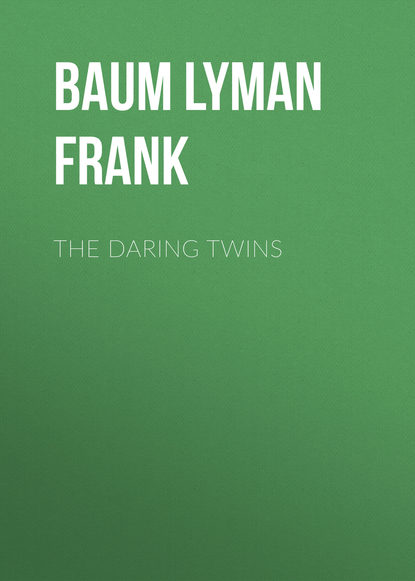По всем вопросам обращайтесь на: info@litportal.ru
(©) 2003-2024.
✖
The Daring Twins
Настройки чтения
Размер шрифта
Высота строк
Поля
“Why foolishly?” inquired Becky.
“Because, I’m working for a living, now, and can’t devote much time to getting into condition. Those Bayport fellows are out every day, and mean to win if they can.”
“I must see that boat race,” said Cousin Judith. “Boating has always been one of my favorite sports. I hope you’ll do well, Phil; but, of course, you can’t neglect business for pleasure.”
CHAPTER XV
SUE GETS A DIVORCE
After breakfast Sue wandered out and found Doris upon the lawn. The youngest of the Darings was now nearly twelve years old and had associated so constantly with her elders that she considered herself quite “grown up” and in no way inferior to Doris Randolph, who, having an advantage in years, assumed toward Sue the airs of a young lady.
Since she had tipped over the punch bowl and taken a lemonade bath a good deal of fun had been poked at poor Sue, which she deeply resented. It was bad enough to have lost all the joy of the party, without being twitted afterward about her misfortune.
Doris was surely too sedate and practical minded to wish to tease Sue, so her greeting was wholly innocent when she said:
“Good morning. Is that the lemonade dress which you are wearing?”
“No,” retorted Sue, flushing; “is that the hypocrite’s dress which you are wearing, Miss Religion?”
Doris was provoked, and with good reason, for she was sincere enough in her religious sentiments. Also, she was still worldly minded to the extent of becoming angry. After a cold, stony look at Sue, she said:
“I have submitted to the insolence of you Darings long enough, and hereafter I forbid you to address me, for I shall not recognize you as an acquaintance.”
At this instant Cousin Judith appeared upon the scene and hearing Doris’ speech stopped short in surprise.
“Why, what is the trouble, my dears?” she asked.
“This child, madam,” returned Doris, stiffly, “is still a barbarian, and unfit to associate with civilized beings.”
“I called her a hypocrite,” flashed Sue, defiantly; “and she is one.”
Miss Eliot was shocked.
“I am surprised, Sue dear; surprised and grieved. You have treated Doris very badly, and I want you to apologize to her for your rudeness.”
“I won’t!” said Sue, stamping her foot. “I’ll die rather than beg pardon of Miss Nancy Hypocrite!”
Judith looked at her in amazement.
“Go into the house, my dear,” she said, rather sternly; “I’ll join you there presently.”
Sue raised her long lashes and swept one rebellious look at the Little Mother. Doris’ face had a slight sneer upon it, and the angry child noted it. Turning squarely about she ignored Cousin Judith’s command and marched down the street toward the village.
Doris gave a little laugh.
“A pleasant mannered young lady, I must say, Miss Eliot,” she tittered. “But, I assure you I meant what I said. I shall never speak to her again, unless she apologizes.”
“An apology is your due, I think,” Miss Eliot said soberly, and then without further remark she continued on her way to the Randolph house to see Marion, with whom she had an engagement.
At noon Sue did not return to dinner. She had called upon Nannette Bennett, who was about her own age, and driven with her to a farm out on the Exeter road.
“Can you stay here to dinner?” asked Nannette.
“Of course,” replied Sue, readily. “There’s no one at home who has the right to give me orders.”
Nannette did not understand this strange speech, but let it pass without remark. The two girls spent all day at the farm, although I am not sure Sue was enjoying herself for a single moment. She did not reach home until the family was seated at the supper table.
Phil had inquired anxiously for his sister, and Judith quietly explained that Sue had called Doris bad names and refused to apologize.
“When I asked her to return to the house, where I hoped to be able to reason with her,” she added, “Sue refused to obey my request and walked down the street instead. I do not know where she is, now.”
Phil was worried, and even Don looked grave.
“I had intended to practice this evening with the boat crew,” said the elder brother, “but I think I ought to hunt for Sue instead. She has been bad and rebellious, I know; but she’s our little sister, just the same, and I’m afraid something has happened to her.”
Cousin Judith made no reply and the meal was progressing in gloomy silence when Sue walked in, threw down her hat and quietly took her seat at the table. She did not look at the Little Mother, nor at anyone else directly, but helped herself to food and with an assumption of composure began to eat.
No one spoke. The others had glanced inquiringly at Cousin Judith, whose face was pale and unrelenting. She did not ask Sue where she had been, nor chide her for disobedience; but she passed the plate of cold meat to her and asked Auntie to bring in Miss Sue’s chocolate.
This condition of affairs was so unusual with the Darings that they were uncertain how to act. Even Becky looked askance at her small sister, as if she were some strange, untamed animal, and Don told himself this escapade deserved a worse punishment than fighting in the mud. He had “taken his own medicine” with frank courage, knowing he deserved the Little Mother’s rebuke and telling her he was truly sorry he had hurt her feelings. But here was little Sue developing a spirit of defiance hitherto unknown in the Daring family circle. Phil was hurt and Phœbe distressed, but both voluntarily left the matter in Miss Eliot’s hands for adjustment.
After supper Cousin Judith said to the culprit in a kindly tone: “Come to my room, Sue. I wish to have a little talk with you.”
“I’ve nothing to talk about,” replied Sue, sullenly.
Phil went away to his practice on the river and Sue followed her sisters out upon the porch. Cousin Judith, perhaps hoping the girl would change her mind, had gone directly to her room.
“You’re acting like a little fool, Sue,” observed Becky. “I’m surprised at you.”
Sue colored, but did not reply. Presently she went to her room and shut herself in until bedtime.
At breakfast next morning Cousin Judith said, addressing all the five Darings, impartially:
“Our contract, the Articles of Adoption, states that if any one of you proves rebellious to my authority the rebel is to be tried by a committee of two, and must abide by the committee’s decision. Is it not so?”
“That’s a fact, Little Mother,” replied Phil, seriously.
“In the case we have now to consider, Sue has disobeyed me more than once,” continued Miss Eliot. “I, therefore charge her with rebellion, and it becomes proper for her to select two of you to try her case. If I am found to be wrong I will ask her pardon and try to make amends. If she is wrong she must ask my pardon and submit to any penalty I may impose.”
Sue paled and then flushed. She cast a furtive glance around the table and then said, in a hard, unyielding tone:
“I’m willing. I choose Phœbe and Don.”
“Very well,” returned Cousin Judith. “The trial shall take place at once.”
None of them saw anything humorous in the situation. As a rule the Darings were merry hearted boys and girls, full of fun and good spirits; but, these Articles of Adoption were regarded by them all as sacred. Each realized to an extent what a blessing the Little Mother had already been to them, and was determined to uphold her authority. For her coming had virtually revolutionized the household and given them a happy home and a sympathetic, generous friend.
Sue, however, marched into the parlor with her stubborn spirit unconquered by any feeling of gratitude, and Phœbe and Donald gravely followed her.

















